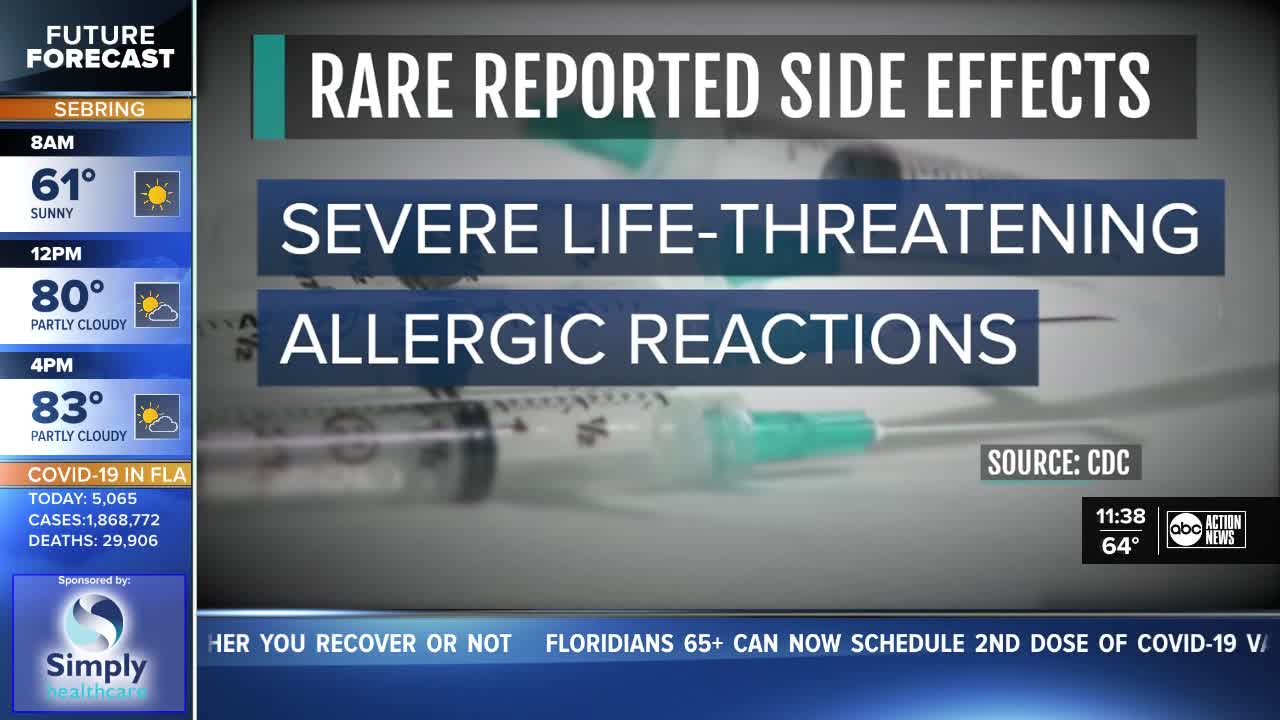TAMPA, Fla. — A report from the CDC is shedding light on the safety of COVID-19 vaccines. Public health experts hope it may help ease minds for some people concerned over safety and persuade others holding off on getting a dose to get vaccinated.
The CDC analyzed safety data from the first month of vaccinations, about mid-December to mid-January. During that period, 13.8 million vaccine doses were administered. The CDC says VAERS, the Vaccine Adverse Event Reporting System, “received and processed 6,994 reports of adverse events after vaccination, including 6,354 (90.8%) that were classified as nonserious and 640 (9.2%) as serious.”
“Almost all of them were just mild: a little bit of headache or fatigue or muscle aches or pain at the site of the injection or something like that, which is like super, super, super safe,” said Dr. Thomas Unnasch, a Distinguished USF Health professor.
The CDC says the symptoms most frequently reported were headache, fatigue, and dizziness. It says rare cases of anaphylaxis were reported as well, coming out to 4.5 cases per million doses administered, which the CDC says is a rate comparable with those of other vaccines.
“If you’re prone to anaphylactic reactions and you carry an Epipen, I would be careful and make sure you stick around for an extra half hour or so after you get your shot,” said Dr. Unnasch. “But for the standard person walking around who doesn’t have any sort of immune-mediated type hypersensitivity, this looks like it’s super safe.”
When it came to deaths reported during that time, the CDC report states: "A total of 113 deaths were reported to VAERS, including 78 (65%) among LTCF residents; available information from death certificates, autopsy reports, medical records, and clinical descriptions from VAERS reports and health care providers did not suggest any causal relationship between COVID-19 vaccination and death."
Another monitoring system, V-safe, found for the Pfizer vaccine, reactions were more frequent after the second dose. Data on Moderna’s second dose wasn’t available at the time.
Unnasch explains the reactions after the second dose have to do with your immune system ramping up.
“The second shot, that’s the klaxons going off on the battleship, and the ‘this is not a drill, this is not a drill, battle stations,’ because it’s already seen it once, and it already knows that it’s something foreign that it needs to attack, and it really jumps on it and then it says, ‘Oh we’ve seen this twice, we’ve got to remember this,’ and it develops a much more long-lasting, much more effective immune response after the second shot," said Unnasch.
The CDC notes healthcare providers and people getting the vaccine can be reassured about the safety of the Pfizer and Moderna COVID-19 vaccines. The CDC and FDA will continue monitoring the safety of COVID-19 vaccines to inform vaccination policy and to help maintain public confidence.
“If you were saying, 'I’m going to hold back and wait until it’s safe,' well now you know it’s safe, so it’s time to line up and get it," said Dr. Unnasch. "It’s a lot better than getting the infection, that’s for sure.”
This story originally reported by Mary O'Connell on ABCActionNews.com



